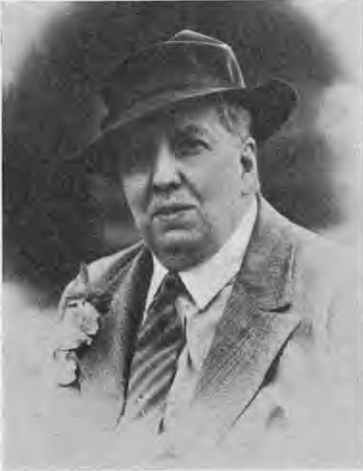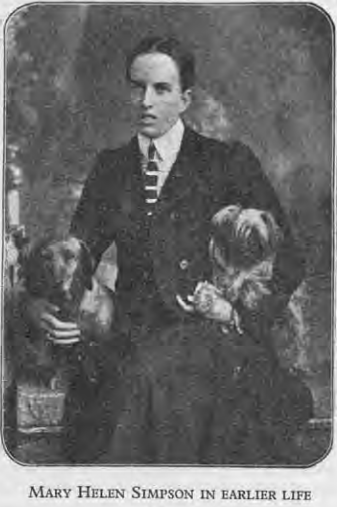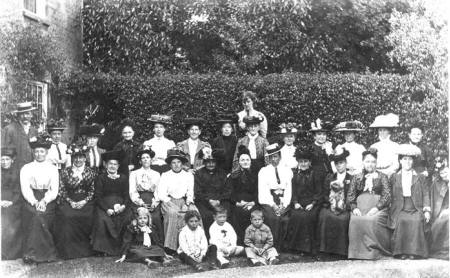

Partner Margaret Rotherham
Queer Places:
Chester House, Higham Rd, Irchester, Wellingborough NN29 7EZ, UK
The Old Vicarage, Caldecott, Wellingborough NN9 6AT, UK
St John the Baptist Churchyard
Chelveston, East Northamptonshire Borough, Northamptonshire, England
 Mary
Helen "Pollie" Hirst Simpson (April 23, 1871 - October, 1947) was the first
woman Women’s Institute Agricultural Adviser in 1925. Her close friend of later days
was Margaret Rotherham.
Mary
Helen "Pollie" Hirst Simpson (April 23, 1871 - October, 1947) was the first
woman Women’s Institute Agricultural Adviser in 1925. Her close friend of later days
was Margaret Rotherham.
Mary Helen Simpson lived in Chelveston, Northamptonshire. Her grandfather, William Hirst Simpson, was Rector of Falkingham in Lincolnshire and was designated to succeed an uncle, Major Hirst Simpson at Roughton Hall, Lincs. Her father, William Hirst Simpson, was born at Falkingham in 1847, educated at Uppingham and St. John's College, Cambridge. In 1870, he married Helen Clark, whose father was Rector of Little Bytham, Lincolnshire. After a brief period in Kent, he settled in Northamptonshire where he bought the old-established solicitor's practice of Henry Greene at Higham Ferrers and succeeded to the position of Town Clerk. He soon identified himself with the County's affairs. After the passing of the Local Government Act in 1888, he was elected County Councillor. In subsequent years he was appointed Magistrate's Clerk to the Justices of Wellingborough. Mary, always known as Pollie, was the eldest of his family of four sons and three daughters. She was born at Tunbridge Wells on April 23, 1871. Her childhood at Higham Ferrers was happy and not too much shepherded. Both parents hunted, Pollie was taught to ride on Applesauce, a quiet old hunter. She became a fine horsewoman. Like a good many girls of her generation she never went to school. There were lessons with a governess but these were interrupted in her early teens when she had trouble with her eyes. Later on she felt the gaps in her knowledge and took correspondence courses in subjects that interested her. She was never bookish, but she had the desire to get to the bottom of things, had a very good memory and she developed independence of mind.


This elegant group, possibly St Katharine's Church Women's Bible Class, was taken around 1902. On the front row, wearing a boater is Bible Class Leader Miss Mary Helen Simpson (Pollie), daughter of William Simpson who owned Chester Farm. She was a superb hockey player, a skilful golfer and represented the County at tennis. William is on the far left of the picture and also wearing a boater.

The photograph above of Chester House taken around 1880 clearly shows a tennis court in the foreground. Evidence of a further tennis court has been found to the west of the walled garden. The main tennis court was in the terraced walled garden to the west of the main house, easily accessible from the house and with ample room for an audience around its side. The one shown on this photo may have been a practice court.
Mary Helen Simpson's mother died when she was 19 years old. Eleven years after the death of his first wife, her father married a connection of hers, Katharine Evans of Chepstow. Pollie continued to sit at the head of the table and carve, and she and her Stepmother were in complete harmony and were the dearest of friends. Their home, Chester House, in the parish of Irchester between Higham Ferrers and Wellingborough, gave Pollie every opportunity for country pursuits. She hunted regularly with the Oakley and occasionally with the Pytchley, the Grafton, the Woodland Pytchley and more distant packs.
Simpson drove a tandem of ponies with skill and attempted one of donkeys. She loved all animals especially dogs, keeping many. Her dachshunds of high degree were well known. She bred and showed them and they won many prizes. She was good at golf and played tennis for the County in 1898. She became a brilliant hockey player. As a skilled gardener she showed sweet peas. In 1902 the marriage of two sons and a daughter reduced the family at Chester House and so her father bought the Old Rectory at Chelveston, an attractive house with a good garden and adjoining paddocks. This was to remain Pollie's home after his death in 1921 until her own 26 years later.
Pollie became known as a steady supporter of the Church. She worked for the restoration of the beautiful old church at Higham Ferrers and gave valuable advice too for repairs at Chelveston's charming small Norman church. A memorial tablet to her there records "nearly half a century's loyal service to this church". She was prominent on the Parochial Church Council, did parish work, sang in the choir and superintended it, taught in the Sunday School, served as a Churchwarden and was a School Manager. Her Bible class at Irchester had been notable.
During World War I she volunteered for war work and became a splendidly energetic Assistant Secretary of the Soldiers' and Sailors' Family Association, covering a large and scattered district on a bicycle. She was later assigned to the Land Army and was appointed regional organiser. Dame Meriel Talbot of the Board of Agriculture was Director of the Land Army, and was concerned also in the beginnings of the Women's Institutes in 1915. She realised Mary Simpson's value which was also recognized by the award of an M.B.E. at the end of the War, in 1919. For one year only she took the Secretaryship of the Northants Nursing Association. She then transferred to the Women's Institutes where she was to find fulfilment and her true vocation. In the autumn of 1920, she was appointed regular organiser of their National Federation for the Midlands area.
Towards the end of 1921, the National Executive asked Simpson to draft a model syllabus for schools of Institute officers. For four successive years she concentrated on such schools in the Midlands area while others did so elsewhere. Similar conferences were held for County Federation officers of which Lady Denman herself took charge. The result was an impressive consolidation of the movement's organisation. The growth was rapid. Between 1919 and 1945 it rose from 1,405 Institutes in 39 Federations, to 6,023 in 58, the total membership increased from 9,722 to 302,419.
In 1925 Simpson was appointed agricultural organiser for the movement. She had studied agriculture and horticulture seriously in as far as they touched her life and that of her neighbours. When Moulton Farm Institute was established, her father as Chairman of the County Agricultural Committee was closely concerned. This Committee became the Institute's governing body. She herself served on it from 1920 till her death. She took active-part in all its work which covered Small Holdings as well as Agricultural and General Purposes. Farmers often came to consult her at Chelveston and she sent learners of both sexes to Moulton. She retired in 1945.
Mary Helen Simpson died in October 1947 and was buried with other Simpsons in the churchyard at Chelveston. The Celtic cross erected in granite on her grave is inscribed IN PROUD AND LOVING MEMORY OF MARY HELEN SIMPSON, M.B.E. Simpson's house was sold a year after her death. The Chelveston Women's Institute then lost its meeting place, her coach house. It rented a room in a cottage, which members decorated themselves, putting up Simpson's and Lady Denman's portraits, but it went through ups and downs. At one point the County Federation Committee felt that, with as low a membership as 13 it should be discontinued. An appeal to Lady Denman resulted in her verdict that "Miss Simpson's W.I. should never be dissolved". It continues and uses the Village Hall.
My published books: